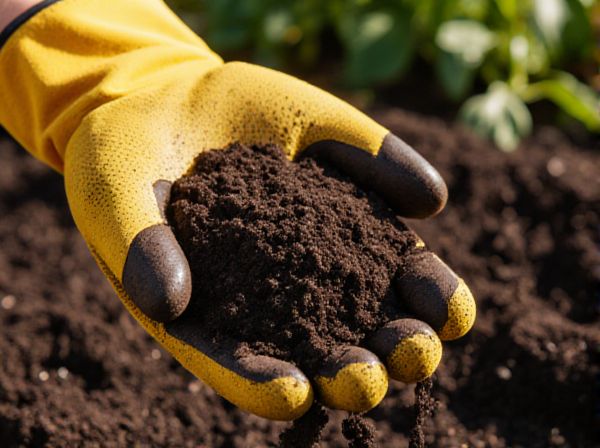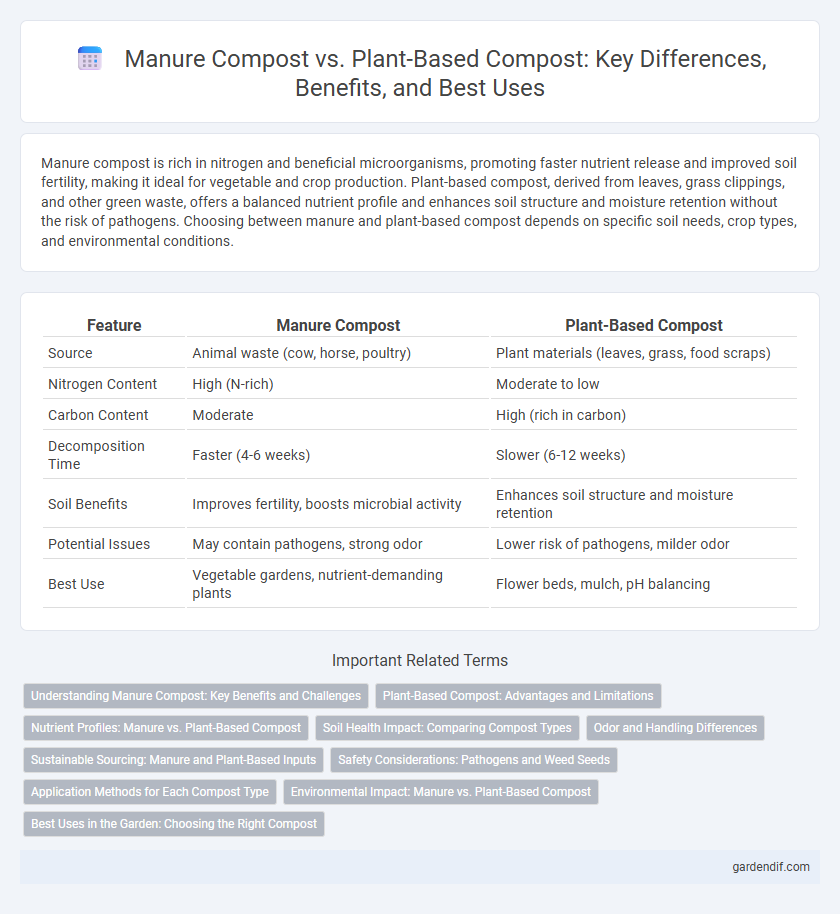
Manure compost vs Plant-based compost Illustration
Manure compost is rich in nitrogen and beneficial microorganisms, promoting faster nutrient release and improved soil fertility, making it ideal for vegetable and crop production. Plant-based compost, derived from leaves, grass clippings, and other green waste, offers a balanced nutrient profile and enhances soil structure and moisture retention without the risk of pathogens. Choosing between manure and plant-based compost depends on specific soil needs, crop types, and environmental conditions.
Table of Comparison
| Feature | Manure Compost | Plant-Based Compost |
|---|---|---|
| Source | Animal waste (cow, horse, poultry) | Plant materials (leaves, grass, food scraps) |
| Nitrogen Content | High (N-rich) | Moderate to low |
| Carbon Content | Moderate | High (rich in carbon) |
| Decomposition Time | Faster (4-6 weeks) | Slower (6-12 weeks) |
| Soil Benefits | Improves fertility, boosts microbial activity | Enhances soil structure and moisture retention |
| Potential Issues | May contain pathogens, strong odor | Lower risk of pathogens, milder odor |
| Best Use | Vegetable gardens, nutrient-demanding plants | Flower beds, mulch, pH balancing |
Understanding Manure Compost: Key Benefits and Challenges
Manure compost offers high nitrogen content that accelerates soil fertility and promotes robust plant growth, making it a valuable organic fertilizer. It also improves soil structure and water retention, supporting healthy microbial activity essential for nutrient cycling. Challenges include managing odor, potential pathogen risks, and the need for proper curing to prevent nutrient imbalances and environmental pollution.
Plant-Based Compost: Advantages and Limitations
Plant-based compost offers significant advantages such as lower pathogen risks and reduced odor compared to manure compost, making it ideal for urban gardening and sensitive environments. It enhances soil structure and moisture retention while supporting beneficial microbial activity without introducing animal-borne contaminants. However, plant-based compost typically has lower nutrient content, especially nitrogen, which may require supplementation for optimal plant growth.
Nutrient Profiles: Manure vs. Plant-Based Compost
Manure compost is rich in nitrogen, phosphorus, and potassium, essential macronutrients that promote vigorous plant growth and improve soil fertility. Plant-based compost typically contains higher levels of carbon and organic matter, supporting soil structure and microbial activity but providing lower immediate nutrient availability compared to manure compost. Balancing the nutrient profiles of both compost types enhances soil health and optimizes plant nutrition for sustainable agricultural practices.
Soil Health Impact: Comparing Compost Types
Manure compost is rich in nitrogen and essential nutrients that accelerate microbial activity, enhancing soil fertility and structure more rapidly than plant-based compost. Plant-based compost, high in carbon and organic matter, improves soil texture and water retention, promoting long-term soil health and microbial diversity. Balanced use of both compost types optimizes soil nutrient availability, supporting sustainable crop growth and ecosystem resilience.
Odor and Handling Differences
Manure compost typically emits stronger odors due to higher nitrogen content and microbial activity, requiring careful aeration to minimize unpleasant smells. Plant-based compost tends to have milder odors and is easier to handle, as it generally contains lower moisture and fewer pathogens. Effective odor management and handling protocols vary significantly between these compost types, impacting their suitability for different composting environments.
Sustainable Sourcing: Manure and Plant-Based Inputs
Manure compost utilizes animal waste, providing rich nitrogen content that enhances soil fertility through sustainable livestock byproducts. Plant-based compost relies on organic plant materials like leaves and crop residues, promoting renewable sourcing and reducing reliance on synthetic inputs. Both methods support sustainable agriculture by recycling natural resources and minimizing environmental impact.
Safety Considerations: Pathogens and Weed Seeds
Manure compost poses higher safety risks due to potential pathogens such as E. coli and Salmonella, requiring thorough thermophilic processing to ensure safe use. Plant-based compost generally presents fewer pathogen concerns but may still harbor viable weed seeds if not properly managed. Proper temperature control and adequate composting duration are critical factors to minimize contamination and promote safe application in agriculture or gardening.
Application Methods for Each Compost Type
Manure compost is typically applied through soil incorporation or side-dressing to enhance nutrient availability, especially nitrogen and phosphorus, for high-demand crops like corn and vegetables. Plant-based compost is often used as a top dressing or mulch, improving soil organic matter and moisture retention while promoting beneficial microbial activity. Both compost types require application timing that aligns with crop growth stages to maximize nutrient uptake and soil health benefits.
Environmental Impact: Manure vs. Plant-Based Compost
Manure compost often contains higher levels of nitrogen and phosphorus, which can contribute to nutrient runoff and water pollution if not managed properly, impacting local ecosystems. Plant-based compost typically has a lower environmental footprint, promoting soil health by enhancing organic matter without the risk of excess nutrient leaching. Both types improve soil structure and carbon sequestration, but plant-based compost generally supports more sustainable nutrient cycling and reduces greenhouse gas emissions.
Best Uses in the Garden: Choosing the Right Compost
Manure compost is rich in nitrogen, making it ideal for vegetable gardens and heavy-feeding plants that require nutrient-dense soil amendments to boost growth. Plant-based compost offers a balanced nutrient profile and improves soil structure, suited for flower beds, shrubs, and acid-loving plants that benefit from organic matter without excessive nitrogen. Selecting the right compost depends on the specific garden needs: manure compost enhances fertility for crops, while plant-based compost supports overall soil health and moisture retention.
Manure compost vs Plant-based compost Infographic

 gardendif.com
gardendif.com